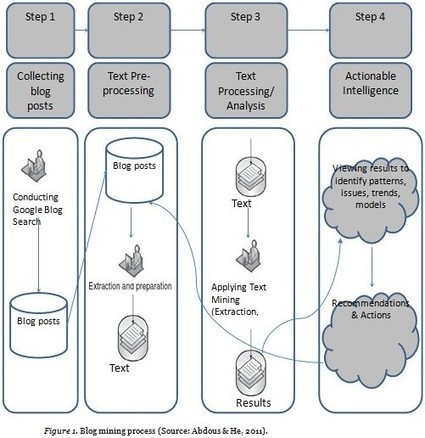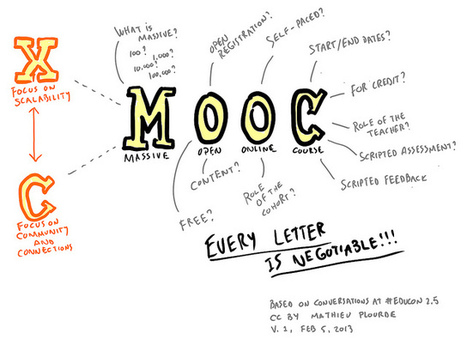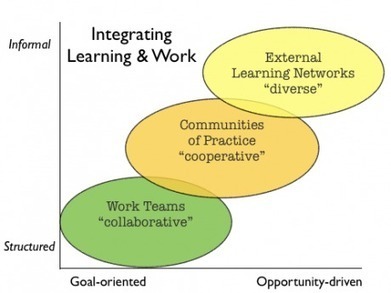 Your new post is loading...
 Your new post is loading...
Abstract: We present an analysis of instructional design quality of 76 randomly selected Massive Open Online Courses (MOOCs). The quality of MOOCs was determined from first principles of instruction, using a course survey instrument. Two types of MOOCs (xMOOCs and cMOOCs) were analysed and their instructional design quality was assessed and compared. We found that the majority of MOOCs scored poorly on most instructional design principles. However, most MOOCs scored highly on organisation and presentation of course material. The results indicate that although most MOOCs are well-packaged, their instructional design quality is low. We outline implications for practice and ideas for future research.
Via Peter B. Sloep, Robert Farrow
Abstract: MOOCs (massive open online course) is a disruptive innovation and a current buzzword in higher education. However, the discussion of MOOCs is disparate, fragmented, and distributed among different outlets. Systematic, extensively published research on MOOCs is unavailable. This paper adopts a novel method called blog mining to analyze MOOCs. The findings indicate, while MOOCs have benefitted learners, providers, and faculty who develop and teach MOOCs, challenges still exist, such as questionable course quality, high dropout rate, unavailable course credits, ineffective assessments, complex copyright, and limited hardware. Future research should explore the position of MOOCs and how it can be sustained.
Via Peter B. Sloep
Brandon Hall Group released this week The Shifting Workforce: Driving Development with Dynamic Learning Networks, a research paper that details how four leading companies are expanding their corporate learning environments to encompass structured knowledge sharing, collaboration, peer coaching, and experience-based connections.
Via Peter B. Sloep, manuel area
The implicit assumption of any peer grading arrangement is that students with minimal direction can do what humanities professors get paid to do and I think that’s the fatal flaw of these arrangements. This assumption not only undermines the authority of professors everywhere; it suggests that the only important part of college instruction is the content that professors transmit to their students.
Via Peter B. Sloep, Learning Environments, Peter Mellow
The possibilities inherent in digital learning won't in and of themselves flatten the global playing field for students, according to new research, unless we first give attention to the idea of creating "connected learning environments."...
Via Anne Whaits
It's a question higher education leaders are asking themselves a lot these days -- what are these so-called MOOCs and should their college or university offer one? Comment: or why Bill and Melinda Gates invest in MOOCs and MOOC research (peter sloep, @pbsloep)
Via Peter B. Sloep
|

|
Rescooped by
juandoming
from gpmt
|
[…] the authors set forth an initial set of architectural entities that describe and define a network of individuals associated together in order to collectively achieve some goal. As the title implies, these associations are focused on learning but in a very broad sense that includes formal education, informal and professional learning, and social action. The structures that we devise and sustain to support this learning are referred to as networks – aggregations based upon connections of people and resources, that in this context are focused on learning – and of course doing so productively.
Via Peter B. Sloep, michel verstrepen
Until last Wednesday, US-based learning platforms have led the development of MOOCs (Massive Open Online Courses). Together, those platforms, including Coursera, edX, and Udacity, serve an estimated 3 million learners worldwide with courses from a number of elite partner institutions, such as Harvard and MIT.
But now, in the same week in which edX announced a partnership with Google for the development of a new, open-source online learning system, the UK has launched its own – and its first-ever – MOOC platform: FutureLearn.
Via Peter B. Sloep
Issue number 33 of eLearning Papers focuses on the challenges and future of Massive Open Online Courses (MOOCs), a trend in education that has skyrocketed since 2008. […] Among other topics, eLearning Papers 33 explores whether MOOCs may be a viable solution for education in developing countries and analyses the role of these emerging courses in the education system, especially in higher education. Furthermore, valuable examples from the field are presented, such as the quad-blogging concept and a game-based MOOC developed to promote entrepreneurship education.
Via Dr. Susan Bainbridge, Peter B. Sloep
Wouldn’t it be great if cMOOcs could be made more ‘productive’ – instead of advancing many people’s knowledge a little by re-creating the same (or similar) new knowledge again and again, can MOOCs be structured to stimulate the creation of new knowledge in a more coordinated way. Can you bring the learners together to produce something entirely novel as they learn? This is in the true spirit of connectivism.
Via Peter B. Sloep, Learning Environments, Peter Mellow
Coursera students will be able to buy in to a "Signature Track" with photo and keystroke identification to prove that they have done the course work themselves.
Via Peter B. Sloep

|
Rescooped by
juandoming
from eLearning
|
"There is currently much interest and excitement at the emergence of an educational approach commonly termed the ‘Massive Open Online Course’ or MOOC. ... I feel there is much we can learn from the delivery of MOOCs that can be used to enhance the on-campus experience supplemented by online course material and delivery. This format offers us the opportunity to investigate learning and improve teaching processes, perhaps more similar to the edX approach. It would seem appropriate to collect and use data to inform this process; treating learning and teaching as a field ripe for research, tying in to a research-led approach."
Via Peter B. Sloep, Paulo Simões
"In my new role as Lecturer in Blended Learning, a part of my role is staff development. Staff development has always been a part of my roles, both in how do you do staff development in a networked world?"
Comment: rich essay on how networked learning prepares people for networked working and networked professional development. It not only advocates the use of social media for this, but also lays out a course-like structure that allows in this case teachers to acquaint themselves with these media. That said, what I miss is what I miss in all these kinds of accounts that promote social media for learning, my own included: how do people learn with them in actual fact and how effectively do they learn? There is the hunch that social media offer unprecedented opportunities for learning. But there still is little evidence to substantiate it. (Peter sloep)
Via Peter B. Sloep, Ignacio Jaramillo
|



 Your new post is loading...
Your new post is loading...




























For anyone with even the vaguest of interests in MOOCs, this is a particularly useful article (in Computers & Education) as it contains the data on an extensive survey of the pedagogical (instructional) qualities of MOOCs. The paper is relatively short and makes for an easy read. For those who want the main conclusions, here they come.
76 MOOCs were scanned, 50 xMOOCs, 26 cMOOCs, using an instrument that contains items derived from Dave Merrill's five first principles of instruction and five more principles derived from the literature more generally. Of the 72 points that any one MOOC that was examined could, none scored higher than 28. The xMOOCs ranged from 3 to25 points, the cMOOCs from 3 to 28. So the xMOOCs score negligibly better only, in spite of the widely held belief that cMOOCs are the pedagogically superior kind. Although the survey logs the situation in 2013, I can't imagine that in a years' time things have significantly improved. So by and large, the conclusions still hold.
These figures then bode ill for the wild plans of the past that MOOCs can replace most existing universities (Sebastian Thrun), falsifies Daphne Koller's claim that Coursera MOOCs are built on sound pedagogical principles, and puts and end the wide-spread fallacy that elite universities necessarily breed top level courses. They corroborate claims made by Tony Bates, which I have echoed here and elsewhere, that MOOCs ignore decades of research in technology-enhanced learning, indeed in instructional design tout court. @pbsloep
Very interesting paper.